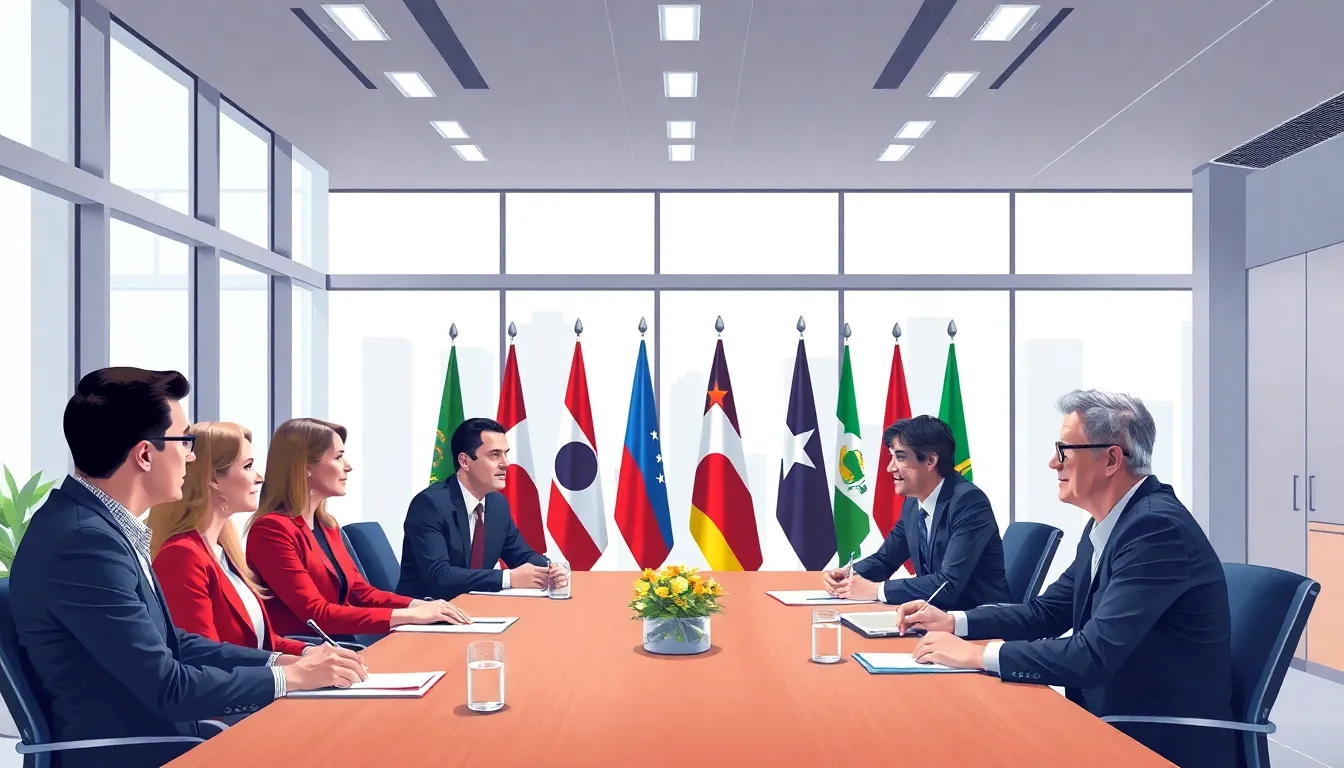Table of Contents
ToggleIn a world where borders blur and cultures collide, the Office of Global Affairs stands as the ultimate diplomatic superhero. With a mission to foster international collaboration, this office navigates the complex web of global relationships, ensuring that nations play nice and work together. Think of it as the United Nations’ cooler cousin—always ready to tackle issues from climate change to trade disputes, armed with a briefcase full of solutions.
But it’s not all serious business. The Office of Global Affairs knows that a little humor goes a long way in diplomacy. After all, who doesn’t love a good pun while discussing peace treaties? By blending professionalism with a dash of wit, this office proves that global engagement can be both effective and enjoyable. Join us as we dive into the fascinating world of global affairs, where serious issues meet a light-hearted approach.
Overview of Office of Global Affairs
The Office of Global Affairs plays a crucial role in shaping international diplomatic relations. This office not only engages with various global challenges but also promotes collaborative efforts among nations.
Mission and Vision
The mission emphasizes building strong partnerships among nations. It aims to address pressing global issues, including climate change, trade disputes, and public health. Vision centers around creating a more interconnected and cooperative global community. This vision seeks sustainable development and social equality, ensuring that diverse voices contribute to global discussions.
Key Functions and Responsibilities
Key functions include fostering international collaborations, monitoring global trends, and assessing their impact on national policies. Responsibilities extend to organizing diplomatic engagements and facilitating dialogue among stakeholders. The office supports initiatives that align with international treaties and commitments. Regular evaluation of global partnerships helps in adapting strategies to changing geopolitical landscapes. Additionally, it acts as a liaison between governmental agencies and international organizations, ensuring cohesive efforts in addressing global challenges.
Importance of Global Affairs

Global affairs play a crucial role in shaping diplomatic relations and economic opportunities worldwide. Their influence extends beyond borders, connecting nations on various issues.
Impact on International Relations
International relations benefit from the strategic frameworks established by global affairs. They promote dialogue between countries, enhancing mutual understanding. Trust builds through consistent diplomatic engagement, leading to partnerships that address global challenges. Conflict resolution becomes achievable through collaborative approaches. Countries find common ground, fostering peace and stability. Such relationships open channels for cooperation on issues like security and climate change. Global affairs also facilitate participation in international organizations, allowing nations to voice aspirations and concerns.
Role in Economic Development
Economic development thrives under the influence of global affairs. They create platforms for trade agreements and investment opportunities. By fostering partnerships, nations expand their markets and access essential resources. Economic policies align through collaboration, promoting sustainable growth. Job creation and innovation often result from international partnerships, driving local economies. Furthermore, global affairs help countries navigate crisis recovery, providing invaluable support during economic downturns. The exchange of knowledge and technology facilitates progress and resilience in communities worldwide.
Structure of the Office
The Office of Global Affairs showcases a structured approach to international diplomacy. Its framework emphasizes effective leadership and collaborative initiatives.
Leadership and Organizational Hierarchy
Leadership within the Office of Global Affairs consists of a diverse team dedicated to promoting global initiatives. The Chief Global Affairs Officer heads the office, ensuring alignment with overall national strategy. Beneath this role, a team of directors oversees key divisions such as international relations, policy analysis, and public engagement. Each division plays a pivotal role in advancing specific objectives aligned with the office’s mission. Moreover, staff members possess various expertise, fostering a well-rounded approach to global challenges. Their combined efforts enhance communication, efficiency, and responsiveness to emerging issues.
Collaborative Partnerships
Collaborative partnerships serve as a cornerstone of the Office of Global Affairs. The office engages with international organizations, private sectors and non-governmental organizations to amplify its impact. Strategic alliances enhance dialogue and knowledge sharing, facilitating innovative solutions to complex global issues. Joint initiatives often focus on climate change, public health and economic stability. Crucially, these collaborations empower nations to address mutual concerns effectively. Regular meetings and workshops foster trust, ensuring that all voices contribute to decision-making processes. By prioritizing partnerships, the office not only strengthens its global presence but also drives impactful change on critical issues.
Current Initiatives and Programs
The Office of Global Affairs actively leads several initiatives aimed at addressing pressing global issues. Climate change initiatives focus on enhancing international cooperation through agreements and shared goals. Programs supporting public health prioritize equitable access to resources and information, bolstering health systems worldwide.
Economic development strategies highlight the importance of trade agreements and investment opportunities among nations. These strategies align economic policies to encourage job creation and innovation. Partnerships with international organizations are crucial for facilitating knowledge exchange and technology advancements.
Ongoing collaborative initiatives emphasize local engagement and grassroots involvement. These programs unite diverse stakeholders, promoting joint efforts in addressing climate resiliency and health challenges. Regular assessments of global partnerships allow the office to adapt its strategies according to evolving geopolitical landscapes.
Engagement in workshops and conferences deepens dialogue among varying sectors, creating forums for shared knowledge and insights. The office’s leadership fosters connections between governmental agencies and non-governmental organizations, enhancing the effectiveness of diplomatic efforts. Each program reinforces the vision of a more interconnected global community, ensuring that diverse voices contribute to the decision-making process.
Innovative projects within the realm of education aim to bolster global understanding and intercultural exchange. Such initiatives equip participants with the skills necessary to navigate a complex world. Sustainability initiatives also focus on reducing carbon footprints and promoting renewable resources through shared practices.
The Office of Global Affairs maintains a commitment to transparency and accountability, ensuring that all initiatives reflect its mission to promote social equality and sustainable development.
Challenges Faced by the Office
Navigating complex geopolitical landscapes presents significant challenges for the Office of Global Affairs. Consistently adapting to rapid changes in international relations requires agility and strategic foresight. Engaging with diverse stakeholders, including governments, NGOs, and the private sector, creates additional layers of complexity.
Maintaining clear communication channels across multiple languages and cultures is vital for successful diplomacy. Overcoming language barriers and varying cultural perspectives often complicates negotiations. Establishing mutual understanding hinges upon active listening and responsiveness, further emphasizing the importance of these skills.
Addressing global issues such as climate change and health disparities poses another critical challenge. Ensuring collaboration among nations demands synchronized efforts and shared resources. Tackling these global challenges necessitates innovative solutions while balancing immediate needs with long-term goals.
Funding barriers can impede the execution of essential initiatives. Securing financial support for projects focused on sustainability and public health often requires strategic alliances. Cultivating partnerships with external organizations may help alleviate budgeting constraints.
Evaluating the impact of global partnerships proves essential for adapting strategies. Regular assessments not only guide decision-making but also promote accountability and transparency in operations. Identifying successful models and understanding shortcomings aids in refining approaches to international collaboration.
Overall, these challenges shape the operational dynamics of the Office of Global Affairs. Each hurdle represents an opportunity for growth and emphasizes the need for a cohesive and responsive framework to achieve its mission.
The Office of Global Affairs stands out as a vital entity in fostering international collaboration and addressing pressing global issues. Its unique blend of professionalism and humor makes diplomatic engagement not only effective but also enjoyable. By prioritizing partnerships and adaptive strategies, the office enhances its impact on climate change, public health, and economic development.
Through ongoing dialogue and innovative initiatives, it navigates complex geopolitical landscapes while ensuring diverse voices are heard. The commitment to transparency and accountability underpins its mission to promote social equality and sustainable development. As the world becomes increasingly interconnected, the role of the Office of Global Affairs will continue to be pivotal in shaping a cooperative global community.





